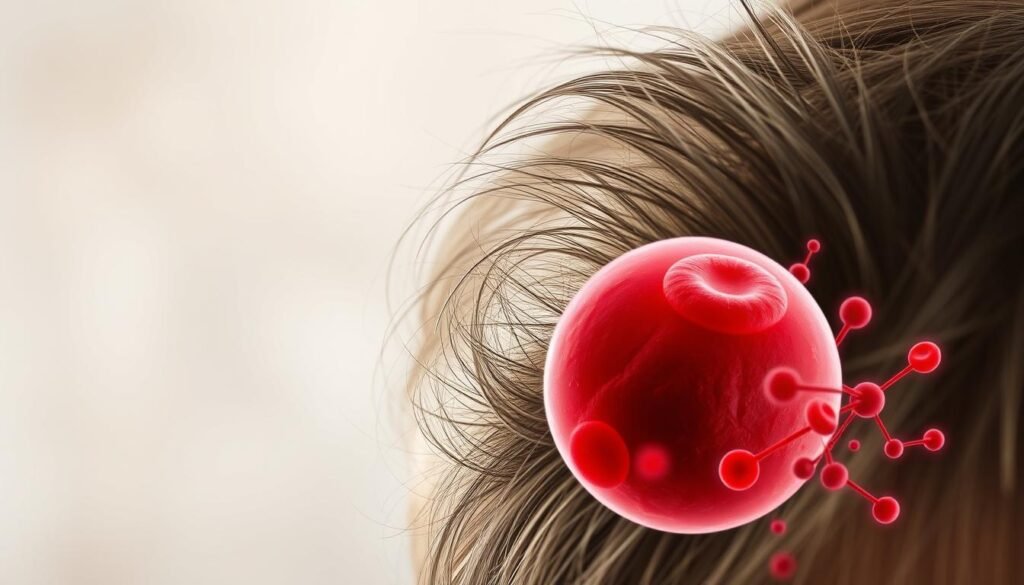Did you know almost 2 billion people around the world have anemia? This makes it the top nutritional deficiency globally. The link between anemia and hair loss is often missed. People with anemia feel tired and weak. They might also see their hair getting thinner and falling out more.
This connection matters a lot. Studies show not having enough iron and ferritin can really affect your hair. We’re going to explore how anemia causes hair loss. We’ll also look into treatments and ways to prevent it.
Key Takeaways
- Anemia affects nearly 2 billion people worldwide.
- Iron deficiency is the leading cause of anemia.
- Low ferritin levels can impact hair health and growth.
- Recognizing the symptoms of anemia can aid in addressing hair loss issues.
- A proper diet and supplementation are key to restoring iron levels.
Introduction to Anemia and Hair Loss
Anemia often goes unnoticed as a cause of hair loss. Many people don’t see the link between anemia symptoms and bad hair health. It’s found that 30% of women and 20% of men suffer hair loss due to iron-deficient anemia. This fact shows why it’s key to spot anemia signs early. Symptoms like hair thinning often occur with it.
Studies show a clear relationship between anemia and hair health. About 70% of patients with common genetic hair loss have low iron. This reveals that hair loss might not just come from genes. It could also come from not having enough nutrients.
In the U.S., people spend over $3.5 billion a year on hair loss treatments. Sadly, 99% of these products don’t work. Knowing about anemia’s impact can lead to better choices. Using treatments for iron deficiency can greatly improve hair health. This shows that hair loss from anemia can be reversed.
Understanding Anemia and Its Types
Anemia is about not having enough healthy red blood cells. This leads to less oxygen going to your body’s tissues, causing health problems like hair loss. It’s critical to know the different kinds of anemia since each has its own reasons and ways to treat it. We often see three main kinds: iron deficiency anemia, vitamin deficiency anemia, and anemia from chronic diseases.
Iron-Deficiency Anemia
Iron deficiency anemia is the most common type around the world. It mainly affects women before menopause because of pregnancy and periods. In men and older women, it often comes from losing blood in the gut or not absorbing enough iron. Doctors use hemoglobin and serum ferritin levels to check for this anemia. It can affect your health badly and even cause hair loss. Studies show it’s linked to conditions like alopecia areata and telogen effluvium.
Vitamin Deficiency Anemia
This anemia happens when you’re low on vital vitamins, such as vitamin B12 and folate. These vitamins are essential for making red blood cells. It can happen because of your diet, trouble absorbing vitamins, or certain health conditions. People with this anemia might feel tired and weak, just like with other types. It can also harm your hair, causing it to fall out or get thinner.
Chronic Disease-Related Anemia
Anemia from chronic diseases comes with long-term health issues like infections, cancer, or autoimmune diseases. In these cases, inflammation messes with the body’s red blood cell production. The severity of this anemia depends on the ongoing disease. It shows how lasting health conditions can lead to hair loss, as the body focuses on vital functions rather than hair growth during long-term illness.
Can Anemia Cause Hair Loss?
Anemia causing hair loss worries many people, especially women. Low iron levels reduce oxygen to hair follicles. This lack of oxygen can hurt hair growth, causing thinning and shedding.
Severe iron deficiency might lead to patterned hair loss. Hair cells need iron to make new ones effectively. Women might see a stronger link, as studies show they have lower iron when losing hair.
Treating anemia is key for those losing hair. Options include iron pills, diet changes, or injections for serious cases. It typically takes three to six months for iron to bounce back after treatment. Restoring iron might reverse hair loss symptoms.
Anemia brings fatigue, weakness, and pale skin, along with hair loss. Working on hair loss and its root cause together offers the best outcome. See a doctor if you’re shedding more hair, to check if low iron is the reason.
Knee-deep in anemia and hair loss? It’s vital to understand their link to tackle them. Find more advice on diet and treatments in this article about anemia and hair loss.
How Anemia Leads to Hair Loss
Anemia is a big problem for people losing their hair. It’s mostly because anemia affects how much oxygen gets to your hair. If you have anemia, you don’t have enough red blood cells. This means not enough oxygen reaches your scalp. Without enough oxygen, hair follicles can’t stay healthy and grow new hair well.
The Role of Oxygen Supply to Hair Follicles
Hair follicles need plenty of oxygen to be healthy. Iron helps make red blood cells that carry oxygen all over, including to your hair. If you’re anemic, you don’t have enough iron. This means not enough oxygen gets to your hair. Low iron can cause hair to fall out, make you tired, give you pale skin, and even make it hard to breathe.
Some things make anemia more likely, especially for women. Women are at a higher risk because of heavy periods and pregnancy. If you’re a vegetarian or vegan, you need to be careful to eat enough iron. That’s because not eating meat can make it harder to get enough iron. To find out if you have anemia, doctors can do blood tests. They check your iron, Ferritin, and other things.
To fight anemia-related hair loss, eating right helps a lot. Foods like red meat, green veggies, dried fruits, and beans are good. Adding these to your diet can make your hair healthier. By doing this, many people see their hair start to grow back.

Anemia Cause Hair Loss: Exploring the Relationship
Anemia and hair loss are closely linked, as noted by doctors and those with symptoms. The anemia hair loss connection is particularly strong with iron deficiency. People with low iron are much more likely to lose hair. This shows how crucial it is to know how anemia affects hair.
A large study with over 10,000 people looked at ferritin levels and hair loss. About 21% had very low ferritin, which impacts hair. Women losing hair without scarring had much lower ferritin levels, proving a strong connection.
Of 928 studies, only 36 were thorough enough for detailed analysis. This shows the careful selection of valid research. Low ferritin across different groups hints at widespread effects on hair. Correcting iron levels can greatly improve hair growth. Some even saw their hair double after fixing their iron shortage.
To wrap up, stories and early studies suggest fixing anemia helps hair. But, we need more research to really understand this connection.
Signs and Symptoms of Anemia Related Hair Loss
Anemia leads to various symptoms that are important for understanding its link to hair loss. It causes more than just tiredness. Knowing these signs can help with early detection and treatment.
Fatigue and Weakness
Feeling extremely tired and weak is common in anemia. This is because of low oxygen in the blood. It makes people feel tired all the time, affecting daily life.
Pale Skin and Shortness of Breath
Pale skin and breathlessness during simple tasks indicate serious anemia. Low hemoglobin levels cause pale skin. It also makes breathing hard during light activities. Recognizing these signs early is crucial.
Physical Signs of Hair Loss
Anemia can cause noticeable hair thinning or loss. This might be distressing. Paying attention to hair loss signs is important for health assessment. Spotting these symptoms early helps with getting the right treatment.
Ferritin: The Key to Hair Health
Ferritin is crucial for hair health as it stores iron in our body. Knowing ferritin levels helps us understand our hair’s condition and growth potential. If ferritin levels get too low, it can cause hair problems.
Understanding Ferritin Levels
Low ferritin means not enough iron, which can lead to anemia and poor hair growth. Research shows people with hair loss often have lower iron levels. Women should have ferritin levels between 20 to 200 nanograms per milliliter, and men between 20 to 500, says the Mayo Clinic. Low serum ferritin levels are linked to hair loss and iron deficiency.
Ferritin and Hair Growth Cycle
Good ferritin levels support the hair’s growth phase, leading to thicker, healthier hair. If hair loss is due to low ferritin, increasing iron might help, but it takes time. Low ferritin can cause hair to become thinner, weaker, and break easily.
Since chronic hair loss often ties to low ferritin, especially in women, a ferritin test is vital. It helps diagnose deficiencies affecting hair health.
| Ferritin Level (ng/mL) | Gender | Implications for Hair Health |
|---|---|---|
| 20 – 200 | Women | Normal range; sufficient for hair health |
| 20 – 500 | Men | Normal range; sufficient for hair health |
| Below 20 | Both | Indicates deficiency; may lead to hair loss |
| Below normal range | Women | Commonly associated with hair loss |
It’s essential to keep an eye on ferritin levels for those losing hair. By tackling ferritin deficiencies, hair health can improve over time.
Diagnosis of Anemia and Its Nutritional Deficiencies
Diagnosing anemia helps doctors link it to hair loss. They use blood tests to find the cause and decide on a treatment plan.
Blood Tests and Their Importance
Blood tests are key in finding anemia. They check serum iron, total iron-binding capacity (TIBC), transferrin saturation, and ferritin levels. These tests show the iron status, crucial for making hemoglobin and red blood cells.
Symptoms like fatigue and shortness of breath may seem common. But, accurate testing is critical. It helps doctors identify true iron deficiency and treat it properly.
Assessing Iron Stores Through Ferritin
Ferritin levels tell us about our iron reserves. Knowing ferritin levels helps understand if anemia is present and how severe it is. If ferritin is low, it might mean nutrition issues affecting health and hair strength.
Doctors use this info to fix iron shortages and avoid anemia-related problems. For more on vitamin deficiency anemia, visit this resource.

Anemia Treatment for Hair Loss
Figuring out how to treat anemia is key to getting your hair to thrive again. If you’re losing hair because of anemia, looking at your diet and adding supplements can really help. These changes not only make you feel better but also give your hair a boost.
Dietary Adjustments and Iron-Rich Foods
Adding foods full of iron to your meals is crucial when fighting hair loss from anemia. You should eat more red meat, eggs, leafy greens, and beans. These foods are packed with the nutrients your body needs for enough iron. Don’t forget to eat Vitamin C foods like oranges and bell peppers too.
They help your body take in more iron. Eating well like this fights off iron deficiency and helps your hair. If you stick to a diet with plenty of iron-rich foods, you might see less hair falling out. Check out this detailed source to learn more.
Supplementation Options for Anemia
If diet alone doesn’t cut it, you might need iron supplements. Doctors often recommend about 50 milligrams a day. Remember, your body can only use about 25-30 milligrams of that. So, it’s a good idea to keep an eye on your iron levels. This helps avoid taking too much while still beating iron-deficiency anemia.
Combining the right diet with supplements can do wonders for your hair and health. It’s a solid approach to getting back on track.
Anemia Hair Loss Connection in Women
Anemia and hair loss in women are closely linked. They lead to both mental and physical hardships. Women are more likely to suffer from iron deficiency and hair loss due to biological reasons. Understanding these issues is the first step towards tackling them.
Impact of Menstrual Cycles on Iron Levels
Menstrual cycles have a big impact on a woman’s iron levels. Those with heavy periods lose a lot of blood, decreasing their iron stores. It’s vital to eat more iron-rich foods to fight against this drop in iron, which can harm hair health.
Shockingly, up to 60% of women don’t have enough iron, often going undiagnosed. If iron levels fall below 140 g/L hemoglobin, it may result in noticeable hair loss.
Pregnancy and Iron Needs
During pregnancy, the iron requirement skyrockets. The developing baby needs it for proper growth. This increased need can reduce the mother’s iron levels, risking hair loss. About half of all pregnant women don’t have enough iron.
Women who could become pregnant should get 27 mg of iron daily. This helps their overall health and keeps their hair healthy. Not getting enough iron can lead to anemia and hair loss, affecting their life quality.

| Demographic | Daily Iron Requirement (mg) | Percentage of Iron-Deficient Women |
|---|---|---|
| Females aged 9–13 years | 8 | Not Available |
| Females aged 14–18 years | 15 | Not Available |
| Females aged 19–50 years | 18 | 20% |
| Females aged 51+ years | 8 | Not Available |
| Pregnant Women | 27 | 50% |
Managing Hair Loss with Anemia
Managing hair loss due to anemia involves several steps. First, it’s critical to talk to a doctor to get a plan that fits your needs. Since not getting enough nutrients often leads to hair loss, focusing on diet is key.
One major cause is iron-deficiency anemia, which affects hair. A blood test can show if you have low iron, which starts the path to getting better. Eating foods high in iron like meats, beans, and spinach helps. Iron pills are also a good way to fix the deficiency. Eating well can aid in bringing back healthy hair and stopping further loss.
It’s also important to look at external things that might harm hair health. For example, tight hairstyles often worn in the Black community, like braids and weaves, can lead to hair damage. To avoid harm, it’s advised to not keep braids for over three months and weaves or extensions for more than eight weeks. Lessening the use of heat on your hair or stopping it altogether can also keep hair healthy.
Understanding how hair loss happens is beneficial too. If your hair gets thinner or you see more of your scalp, it could be a sign of a problem. Stress or not eating well might cause a condition called Telogen Effluvium, which leads to a lot of hair falling out. Knowing this helps you seek help earlier, which can speed up recovery.
Using different methods to improve hair health is wise. Mixing changes in diet with careful hair care lets people handle hair loss from anemia well. Seeing a doctor regularly ensures that iron levels and overall health are checked, helping find the best ways to get your hair back to good health.
Anemia Hair Loss Prevention Strategies
It’s key to understand anemia hair loss prevention to keep your hair healthy. Knowing which groups are more at risk can help us prevent their hair loss. This means we can step in early to save hair follicles.
Identifying At-Risk Populations
Some groups face higher iron deficiency rates, affecting hair health. For example, menstruating women lose iron through blood each month. Vegetarians might not get enough iron from their diet. Those with gut issues may struggle to absorb nutrients. This shows why it’s crucial to know who’s at risk of anemia.
| At-Risk Group | Reason for Risk |
|---|---|
| Menstruating Women | Monthly blood loss leading to potential iron deficiency |
| Vegetarians | Regular diets may lack adequate iron intake |
| Individuals with Gastrointestinal Conditions | Decreased absorption of essential nutrients |
To fight anemia’s effect on hair, we can take several steps. Adding iron-rich foods into our diets is one. It’s also smart to get regular blood tests for iron levels. Talking to a doctor can give us advice tailored to our health.
For more on hair loss and its causes, visit this informative resource.
Conclusion
Anemia and hair loss are closely linked, and understanding this is key. If you’re low on iron, you might notice your hair falling out more or changing in texture. It’s because not having enough iron affects your whole health, as well as how well your hair grows.
It’s crucial to keep an eye on your iron levels, like checking your serum ferritin. If it’s low, you might need to eat more iron-rich food or take supplements. But remember, too much iron isn’t good either. Always talk to your doctor first.
If you’re dealing with hair loss due to anemia, learning how nutrients affect hair growth is vital. With the right care, you can see your hair get better. That brings back confidence and makes you feel good again.